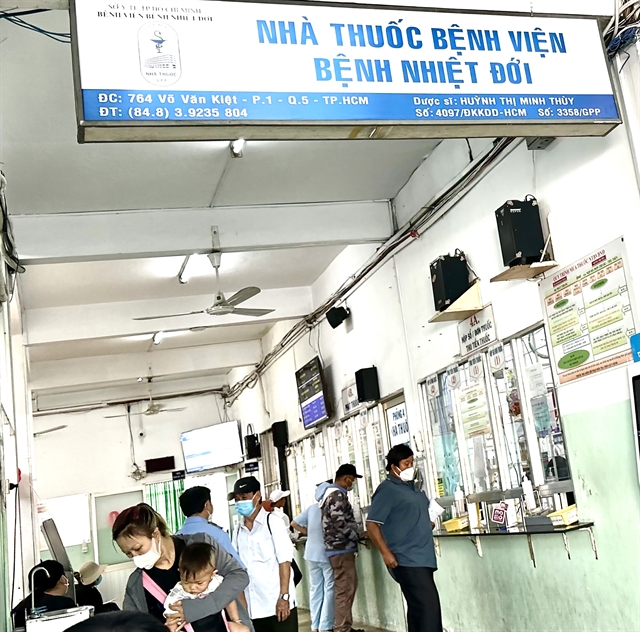HCM City allowed to proactively import specialised, rare drugs
Society – Economy - Ngày đăng : 11:54, 31/07/2024
 |
| The Pharmacy Counter at HCM City's Tropical Diseases Hospital in District 5. — VNS Photo Nguyễn Diệp |
HCM CITY — HCM City is allowed to proactively import drugs, especially specialised and rare drugs, for the special treatment needs of medical facilities to promptly meet disease prevention requirements and other urgent needs.
The city’s Department of Health on July 16 announced that the Government had issued Decree No.84/2024/ND-CP on piloting the decentralisation of state management in certain fields to city authorities.
Accordingly, in the healthcare sector, the city is authorised to decide on the import licensing of medicines needed for special treatments arising during medical examinations and treatment as stipulated by medical facilities under the city's management.
Tăng Chí Thượng, director of the Department of Health, said although health centres in the city had implemented drug procurement bidding for medical stations in recent years, the results of drug supply bidding for most health centres in districts and Thủ Đức City had been limited.
“The list of drugs does not fully meet the medical examination and treatment needs at medical stations and does not align with the actual expectations of both patients and doctors,” he said.
The procurement of drugs for primary healthcare facilities still faces several challenges, including the prolonged process of selecting drug suppliers and a high percentage of items for which no suppliers are chosen, according to Thượng.
The main reason is many suppliers do not participate in the bidding process because the quantity of drugs purchased by each health centre is small compared to the volume supplied to higher-level treatment units.
Additionally, the personnel at health centres responsible for bidding lack both in number and professionalism.
To address this issue, the city’s Department of Health has determined that ensuring the supply of drugs for primary healthcare facilities is one of the key tasks of the city's healthcare sector.
Since the Bidding Law took effect on January 1, 2024, the department has developed a plan for centralised drug procurement for primary healthcare facilities to enhance the capacity to supply drugs for treatment needs, especially at medical stations.
“This policy has received the consensus of the People's Committees of districts and Thủ Đức City and has been implemented for health centres uniformly," Thượng said.
Currently, the department has compiled drug lists from various health centres for generic drugs, consisting of over 400 types of drugs, and herbal medicine, which includes drugs combining active ingredients with herbal and traditional medicines, totalling nearly 60 types of drugs.
It has entrusted Hùng Vương Hospital and the Traditional Medicine Hospital, which are recognised for their capacity and experience in managing the bidding process, with these contracts and mobilised healthcare professionals to support the selection of contractors.
The hospitals are diligently proceeding, and it is anticipated that by September this year, the city will finalise contractor selections to commence drug supply to health centres and medical stations.
In addition to efforts to supply drugs to primary healthcare facilities, the Department of Health is focusing on ensuring drug supply for the entire healthcare system across the city.
To monitor and facilitate drug supply, it has established a task force for procurement and distribution coordination. This task force gathers information on drug supply from healthcare facilities to provide timely support.
Regarding rare drugs, it maintains regular communication with the Ministry of Health to implement supportive measures for hospitals.
It has reported to the Drug Administration Department under the ministry and promptly imported several rare drugs into Việt Nam to meet treatment demands, including globulin, diphtheria antitoxin serum and methotrexate.
Some drugs have already completed licensing procedures and will soon be imported into the country.
The city is committed to strengthening its primary healthcare facility operations to build a resilient grassroots healthcare system and an extensive network accessible to all residents.
This involves enhancing human resources, infrastructure, and technological capabilities to effectively meet the community's healthcare needs.
In addition, improving drug supply is considered a critical initiative to encourage more people to utilise local health stations for medical consultations and treatments, according to Thượng. — VNS
